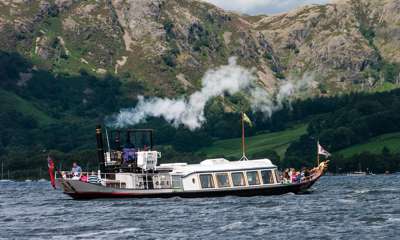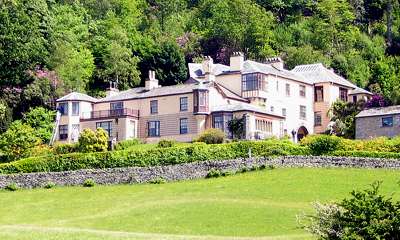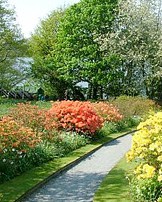
.jpg)
Brantwood
.jpg)
Steam Yacht 'Gondola'
.jpg)
Brantwood
.jpg)
Coniston Old Man

Full Day
Final drop-off approx. 5:30pm
We start the day with a scenic drive from Ambleside down through the Monk Coniston Estate which once belonged to Beatrix Potter, to Coniston Hall to look at a perfect example of vernacular Lakeland architecture. Squatting on the very edge of the lake, this ancient hall was admired by John Ruskin who could see it from his beautiful Brantwood Estate across the water.
Back on the bus and we are off on a short drive to the bustling Victorian village of Coniston.
On our arrival at Coniston, we will guide you on a short walking tour of the village pointing out everything of interest and all the places you need to know about.
The walking tour finishes at The Ruskin Museum. Your entry is included in the tour and here your guide will leave you to explore this fascinating museum at your own pace.
Coniston is the designated early Lunch stop. There are plenty of café's and pubs where you can sample the delicious local produce and even sample the local brew at the 400-year-old Black Bull Inn. Don't eat too much though as we will be visiting the Terrace Café at Brantwood later.
We now go back along the lake to the jetties for your cruise of Coniston Water aboard the Steam Yacht Gondola* which is included in the tour. There is nothing to compare with a cruise along the lake on a fine summer's day and the crew of the yacht will keep you entertained with their impressive knowledge of the boat, lake and its history. If Steam Yacht Gondola is unable to sail, we will use an alternative Coniston Steamer for the cruise.
Alight at Brantwood Jetty where your guide will rejoin you for the short walk up to the house via the delightful gardens of the estate.
At the top of the hill, your guide will lead you to the house for your visit to Brantwood House and Gardens. This is included in your tour and you will have plenty of time to see the house and explore the glorious gardens at your own pace. Your guide will be on-hand to answer any questions you may have but the real delight of Brantwood is that you can simply explore the estate and admire the stunning scenery yourselves. The excellent Terrace Café is available for a quick cake and a coffee and then we set off for the last short scenic drive along windy Lakeland roads back to the first return drop-off point in Ambleside and then Windermere and Bowness.
* We will always endeavour to provide your trip on Gondola, however as this is operated by a third party and beyond our control, if this is not possible we will substitute for a Coniston Cruises trip on the lake. In the event of bad weather and no cruises are available, we will drive you around the lake to Brantwood.
The English Lake District weather can change quickly, even in the summer months. Please bring a waterproof coat with a hood in case of rain or windy weather.
As there is some walking involved in the tour, some uphill and on uneven or wet terrain, please wear suitable, comfortable shoes.
This tour is not suitable for children under the age of 5.
Here is some more detailed information about the places you will be visiting on the tour.
At the foot of Coniston Old Man, the 2635 feet high fell classified as the seventh highest mountain in England, lies the charming village of Coniston. The side of the fell bear the scars of past copper mining and slate quarrying. Coppermines Valley is the name of the vale beneath the fell, its name confirming its industrial past. However, the Old Man of Coniston is a much more peaceful place today.
There have been signs of habitation in this area since the Bronze Age and the area was mined by the Romans. The original village was built around the 16th Century Coniston Hall, a building with a multitude of chimneys which you will look at later. At the foot of Coniston Old Man is the 400-year-old Black Bull Inn, which operates as a local brewery. Coniston today is very much the Victorian mining village, with a few shops and cafés on its main street. John Ruskin is buried in the churchyard of St Andrew's Church, beneath a tall, beautifully carved Celtic cross.

Your entrance to this fascinating museum is included in the tour and so your guide will leave you here to enjoy your visit and then explore the village at your own pace.
The Ruskin Museum's Coniston Gallery introduces 500-million-year-old rocks, and one of the first Rock Bands, who played musical stones; examines the mines that helped to copper-bottom Naval and merchant wooden ships, and the slate quarries that have roofed the world; studies the dry-stone and cobble walls that stride the fells, and looks at the truth to local stone, slate and oak exemplified in traditional vernacular buildings. Coniston is Herdwick country ? black lambs, grey sheep with smiling white faces, and an intriguing mix of Celtic and Norse heritage - a hardy native breed whose fleece made John Peel's 'coat so grey'. The breed was much-loved by Beatrix Potter, who owned farms in the parish.
Coniston is also Swallows and Amazons country. Arthur Ransome fictionalised the lake and The Old Man [The Matterhorn/Kanchenjunga], borrowed Peel Island's secret harbour for Wild Cat Island, and SY Gondola for Captain Flint's houseboat, and used the copper-mines and slate-quarries as the context for Pigeon Post. His readers will discover in the museum the sailing dinghy Mavis, the inspiration of the fictional Amazon, complete with centre-board.
The Bluebird Wing, has been built as the future home of Donald Campbell's iconic hydroplane Bluebird K7, once the wreckage from the fatal crash in 1967 has been conserved and rebuilt to operative condition. This gallery contains extensive displays of memorabilia, a large-screen photographic presentation, touch-screen inter-actives with much background information, the Bristol-Siddeley Orpheus engine that was in the lake for 34 years, and Donald Campbell's pension plan, the prototype Bluebird JetStar ski-boat.
The Ruskin Museum's Ruskin Gallery holds the most comprehensive display in the Lake District about the life and work of John Ruskin who had one of the most profound and influential minds of the Victorian age, becoming the greatest pundit on aesthetics and ethics in the English-speaking world. He was a superb watercolourist and draughtsman, who worked out most of his ideas visually, through drawing in almost forensic detail ? seeing clearly the links between the structure of crystals and the mountains they formed; art and buildings in relation to the society that bred them; the environmental, ecological and moral pollution of the Industrial Revolution and the greed under-pinning Capitalism.
Coniston Water is about half a mile from the village. It is about five miles long and the head of the lake is surrounded by some of the loveliest fells.
Another famous grave in the village is that of Donald Campbell, who died tragically on Coniston Water whilst trying to beat his own water speed record in 1967 on his jet-powered boat "Bluebird". His body was not recovered from the deep lake until 2001. Details of Campbell?s life and achievements are displayed in the Ruskin Museum. There is a plaque to Campbell by the lakeside.
The sixteenth-century Coniston Hall, former medieval home of the Fleming family, was admired by both the gothic novelist Anne Radcliffe, and the romantic poet Coleridge. Situated on the western shore of Coniston Water, it was discussed and illustrated by Ruskin in his "Poetry of Architecture" to illustrate a discussion on chimneys, for which it is famous. In his eyes, Coniston Hall is the perfect Lakeland architecture, sturdy and rough-hewn, blending supremely with the rugged scenery. Sadly, we cannot enter the hall but can admire the striking exterior features for which it is known.

The 45-minute cruise on Steam Yacht Gondola is included in the tour.
Sit back and enjoy the charm of luxury travel once experienced by wealthy Victorians, riding in style in Gondola's opulent saloons or relaxing on her open-air decks as she glides across Coniston Water. Watch the gleaming steam engine in operation from the open viewing windows and quiz the boat's engineer on its workings. Take in the spectacular scenery of the Coniston Fells and listen to the crew's commentary on the area's history and famous connections.
Gondola is one of the inspirations for Captain Flint's houseboat in Arthur Ransome's book "Swallows and Amazons". You may have seen in Coniston's Ruskin Museum the a black and white post card of Gondola that Ransome sent to his illustrator, with changes to the outline in ink to show how he wanted the houseboat to look.
The cruise follows the western bank of the lake southwards and turns at about the spot where Donald Campbell had his tragically fatal accident in Bluebird. She then steams northward and cruises along the eastern bank stopping at the Brantwood Jetty where you will leave her passing through the Harbour Walk to Brantwood House and Gardens.

Your entrance to Brantwood House and its glorious gardens are included in the tour. Here your guide will allow you to explore the house, gardens, Blue Gallery and Severn Studio and a modern version of Ruskin's own slate lithophone displayed in the Linton Room by yourselves.
Inside the house there is a small gift shop and the delightful Terrace Café is in situated what used to be Ruskin's coach house. Here you can enjoy a delicious selection of creative and seasonal dishes whilst experiencing the breath-taking views over Coniston Water and the sublime Old Man that inspired some of John Ruskin's finest art and writing. He described the view as "on the whole, the finest view I know in Cumberland or Lancashire" and when you see it, you will agree.

The house offers a fascinating insight into the world of John Ruskin and is filled with many fine paintings, beautiful furniture and Ruskin's own personal treasures, retaining the character of its famous resident.
Brantwood remains a place of inspiration. Displays and activities in the house, gardens and estate reflect the wealth of cultural associations with Ruskin's legacy - from the Pre-Raphaelites and the Arts and Crafts Movement to the founding of the National trust and Welfare State. Brantwood is a registered museum, but is still kept very much as a home. The house affords a unique opportunity to look into the daily life of one of England's most important social and cultural figures. The atmosphere at Brantwood is special, and because so many of Ruskin's possessions remain, it feels as if the man himself has just stepped out into the garden!
Brantwood has unique and beautiful mountainside gardens, set in a 250 acre wood estate with spectacular views over Coniston Water and the fells beyond. 'Brant' is Norse for steep, and Brantwood's steep woods were first worked by Norse invaders in the ninth century. With a stunning diversity of flora and fauna, these ancient semi-natural woodlands comprise half the 250 acre estate. Elsewhere the estate ranges from lakeshore meadows to high, open fell.
The Harbour Walk was laid out by Ruskin's cousin, Joan Severn, as a formal walk, framed by sweetly scented azaleas that still bloom today. It borders the apple orchard grown particularly for its flowers, and the wild daffodil field beloved of Ruskin.
The Trellis Walk, with its fine herbaceous planting, traces the historical significance of plants in British culture, from medieval times, via William Morris and the Victorians, to the present day.
The Hortus Inclusus is an enclosed garden of British native herbs, laid out in the form of a medieval manuscript.
It explores the uses of over 200 herbs by habitat according to medicinal, culinary, cosmetic and aesthetic uses.
The High Walk was created by Ruskin's cousin, Joan Severn, to provide a spectacular viewing terrace of some of the finest Lake District scenery. Its neatly mown levels, colour and scent contrast with the Maple Walk below and the rugged fells beyond.
The Professor's Garden was Ruskin's favourite garden. It represented the lowly mountain crofter's plot and was dedicated to plants which were good for both body and soul.
In it is the bee 'penthouse' and above is the slate throne of Ruskin's Seat.
The Fern Garden is a maze of over 250 different types of British native ferns which thrive in the woodland climate of Brantwood. The garden surrounds the ice house which was built in a cave excavated by local miners.
The Moorland Garden was the site of a visionary experiment in upland agriculture, long since abandoned. It features terraces fashioned from the natural forms of the land and two resevoirs.
The Zig-Ziggy is based upon designs first sketched by Ruskin 130 years ago, and is said to represent Dante's Purgatorial Mount.
Fully realised today in contemporary form, it allows you to begin your tour of the gardens by making an allegorical journey to Paradise!



To display the available dates for this tour please answer the questions below.
We can accept bookings up to 30 minutes before the departure time from your chosen pickup point, provided that we have availability.
You will not need to print anything out. Just book, read the confirmation email and wait at the pickup point!

No dates found for this tour